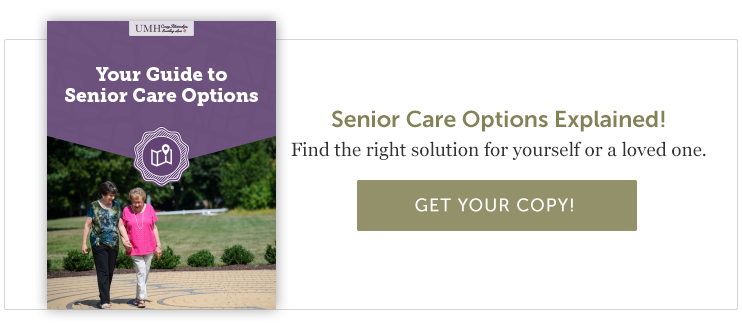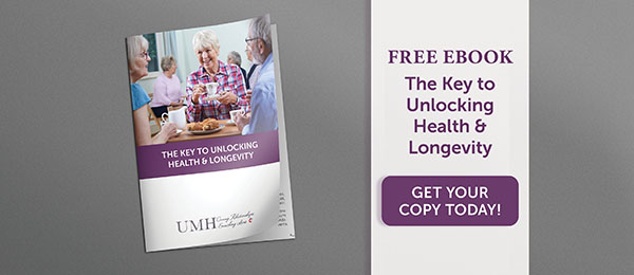As November ushers in chillier weather and Thanksgiving preparations, many of us embrace the beginning of the holiday season. For so many, this is an exciting, joyful time of year, but for others, it can have unexpected impacts on their state of mind and physical health. Even amidst the exuberance of the holidays, plenty of older adults find themselves feeling lonely, overwhelmed, stressed, or even depressed, all of which can jeopardize physical health.
To foster a greater understanding of how this season can pose very difficult emotions for an aging loved one, we’re exploring some of the most common impacts—and discussing how senior living communities can be integral in providing the support they need to manage these holiday challenges in a healthier way.
The Heaviness of Loss
From Thanksgiving to New Year’s Day, there are so many opportunities for celebration and connection. For some seniors, however, these festivities only magnify the heaviness they may feel from losing a spouse, close family member, or friend. Memories of holidays past can be reminders of what—or who—is now missing from their life, and that’s a heartbreaking reality to face.
What’s more, the reliving of loss at this particular time of year may lead to loneliness and depression, both very detrimental issues for seniors. Often, these states of mind lead to further withdrawal, which has the potential to negatively impact not just one’s mental and emotional well-being, but also their physical health. Depression can range from mild to severe and manifest itself through other illnesses, such as hypertension, immune dysfunction, and heart disease.
Some of the most valuable ways a senior living community can support an aging loved one dealing with loss or depression during the holidays (and throughout the year) is through the experience of being in connection with others. The community environment provides daily opportunities for socialization, physical activity, education, and recreation—all of which help to cultivate greater purpose and healthier well-being. Ongoing ways to stay connected with a community of residents, staff, and even one’s own family can help seniors avoid the spiral of self-isolation that often accompanies loss and loneliness, especially during the holidays.
The Fear of Holiday Overwhelm
If an aging loved one has been spending lots of time at home on their own, the bustle of the holidays can be a big transition and an overwhelming experience. From the noise of a large gathering to the fast pace of holiday activities, they may feel anxiety over the seasonal goings-on. Stress is a danger at any age, and for seniors, this time of year may be a stress-inducing one. If they overdo it, there’s also the risk of exhaustion, which puts older adults at a higher risk of experiencing falls and other physical hazards.
In a senior living community, aging adults have the freedom to embrace the holidays at their own pace. There are even supports in place that helps seniors navigate daily activities so they don’t become overwhelmed by mental and physical needs. There is connection and camaraderie when celebrating the season is a welcome opportunity, as well as privacy, comfort, and quiet when a slower or less busy environment is desired.
Plus, many senior living communities make transportation more accessible for older adults—a particular asset when driving becomes a safety or financial issue and being transported by a caregiver is not always practical. Having the luxury of being shuttled to shopping centers and holiday-related activities can be a major stress relief for seniors who no longer feel comfortable driving.

The Strain of Physical Limits
The aging process is no doubt a tricky one, particularly when declines in physical mobility impact one’s daily activities and put a strain on their usual ways of celebrating the holidays. Some seniors may be dealing with pain or ongoing ailments, or they could be mourning the loss of their previous mobility and feeling overly dependent on others. Either way, the holidays can magnify an aging loved one’s physical limits and loss of independence, overshadowing the joy and warmth of the season.
That’s why another meaningful benefit of senior living communities is the availability of staff who are trained and ready to help ensure that senior mobility needs are met. Depending on your aging loved one’s level of need, there are opportunities to garner assistance with a span of mobility challenges—from engaging in activities of daily living (like bathing and dressing) to getting from place to place. There is also access to important elements like medical care, physical therapy, medication management and exercise programs that help seniors maintain and strengthen their current level of physical health.
Ultimately, seniors who open themselves up to this kind of access and assistance find that doing so supports even greater energy and enthusiasm for other activities, like those surrounding the holidays. It actually renews their zest for living a more enriched and purposeful life in the most independent way possible. They’re able to maintain dignity and usefulness so they can thrive and experience joy. This is arguably the most valuable gift for an aging loved one to claim this time of year.
As the holidays kick into high gear, it’s important to recognize these and other unexpected impacts the season may have on your aging loved one. For a variety of reasons, they may not be approaching this time of year with the same excitement or easefulness they once did. Consider exploring how the benefits of a senior living community could provide an environment that supports a healthier, more connected lifestyle—one that can help make the holidays brighter for the aging adult in your life.
To find out how United Methodist Homes provides a wealth of offerings and opportunities to support the health and wellbeing of our residents, contact us today or schedule a complimentary visit now. For additional tips on senior health and lifestyle issues, check out our blog.







